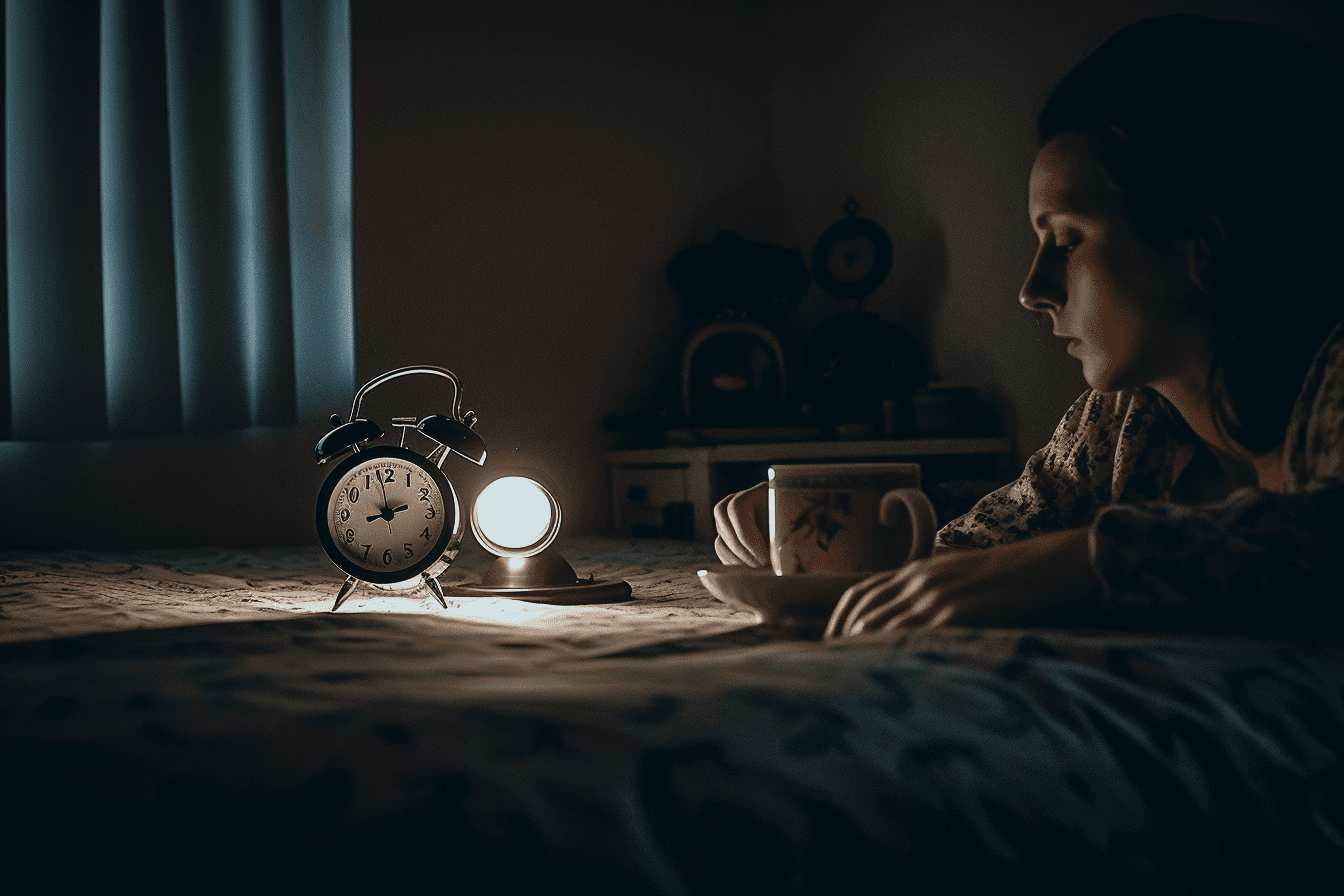What Are The Effects Of Caffeine On Sleep Cycle

You love your morning cup of coffee, don’t you? It’s part of your daily routine, and it helps you start your day on the right foot. But have you ever wondered what impact caffeine has on your sleep cycle? Well, wonder no more.
This article will delve into the effects of caffeine on your sleep cycle and help you understand why changing certain habits can lead to a better night’s sleep.
Caffeine is one of the most widely consumed stimulants worldwide, found in tea, coffee, chocolate, energy drinks and some medications.
While drinking moderate amounts of caffeine (less than 400mg per day) doesn’t usually cause any harm to most people, it can affect your sleep quality in several ways.
In this article, we’ll explore how caffeine causes sleep onset delay and reduces slow-wave sleep while also disturbing melatonin production.
We’ll also look at how it affects REM sleep duration and overall nighttime restfulness before discussing possible solutions for those who want to enjoy their morning coffee without compromising their quality of life due to poor sleeping habits.
How Caffeine Causes Sleep Onset Delay: Effects on Your Sleep Cycle
The reason you might find yourself tossing and turning at night could be due to that cup of coffee you had earlier in the day. Caffeine intake can cause a delay in sleep onset, meaning it takes longer for you to fall asleep.
Studies have shown that even consuming caffeine 6 hours before bedtime can lead to prolonged sleep latency and reduced slow wave sleep. The effects of caffeine on your sleep cycle are well-documented.
Slow wave sleep is important as it is the stage during which your body repairs itself, and caffeine can reduce this restorative component of your nightly rest. As a result, even if you do manage to get some shut-eye after drinking caffeine, it may not be as rejuvenating as it should be.
Reduced slow-wave sleep has been linked to symptoms of sleep deprivation such as fatigue, irritability, and difficulty concentrating.
Reduced Slow-Wave Sleep: The Impact of Caffeine on Your Restorative Sleep
You might not realize it, but that morning cup of coffee could be robbing you of the deep, restorative sleep your body needs to function at its best.
Caffeine intake has been shown to reduce slow wave sleep (SWS), which is the stage of sleep responsible for physical restoration and recovery.
Here are four ways caffeine can impact your SWS and overall sleep cycle:
- Caffeine delays the onset of SWS, meaning it takes longer for your body to enter this crucial stage of sleep.
- Even when you do finally reach SWS after consuming caffeine, the amount of time spent in this stage is reduced.
- The reduction in SWS can lead to decreased energy levels and increased fatigue during waking hours.
- Over time, consistent caffeine consumption can disrupt your overall sleep cycle, leading to chronic sleep disturbances and poor quality rest.
But don’t worry – reducing or eliminating caffeine from your diet isn’t always necessary to improve your restorative sleep.
In the next section, we’ll explore how understanding the link between caffeine and worsened sleep quality can help you make informed decisions about when and how much caffeine to consume throughout the day.
Worsened Sleep Quality: Understanding the Link between Caffeine and Sleep
If you want to improve the quality of your rest, it’s important to understand how consuming caffeine can impact your natural sleep rhythms and leave you feeling groggy and fatigued throughout the day.
The truth is that caffeine intake can have negative effects on your sleep quality, leading to sleep disturbances such as prolonged sleep latency and disturbed sleep.
Numerous studies have shown a clear link between caffeine consumption and worsened sleep quality. In fact, even moderate amounts of caffeine consumed in the afternoon or evening can disrupt your natural circadian rhythm and make it more difficult for you to fall asleep at night.
This effect is particularly pronounced in individuals who are already sensitive to the stimulating effects of caffeine, such as those with anxiety or insomnia.
By reducing your overall caffeine intake or avoiding it altogether in the hours leading up to bedtime, you may be able to improve your overall sleep quality and wake up feeling more refreshed each morning.
With increased daytime sleepiness being a common problem among many people today, it’s important to take steps towards better understanding how caffeine affects our alertness levels.
Increased Daytime Sleepiness: How Caffeine Affects Your Alertness and Energy Levels

Feeling tired and sluggish during the day? Discover how that cup of coffee in the morning may be impacting your energy levels and alertness.
Caffeine consumption is known to cause daytime sleepiness, especially when consumed in large amounts or later in the day. This can lead to difficulty focusing and decreased productivity, which can be frustrating for those trying to stay on top of their daily tasks.
Energy drinks also contain high levels of caffeine, which can further exacerbate feelings of lethargy and grogginess throughout the day. It’s important to monitor caffeine intake and try to limit consumption to earlier hours in order to avoid disrupting your natural sleep cycle.
By doing so, you may find that you feel more energized and refreshed throughout the day without relying on stimulants like caffeine administration.
As you begin to understand how caffeine affects your body’s natural rhythms, it’s important to note that this substance can also decrease melatonin production. This hormone is responsible for regulating our sleep-wake cycles, meaning that disruptions in its production can lead to difficulties falling asleep at night.
In the next section, we’ll explore how caffeine disrupts your body’s natural sleep hormone and what steps you can take towards a better night’s rest.
Decreased Melatonin Production: How Caffeine Disrupts Your Body’s Natural Sleep Hormone
Well, isn’t it just grand that our beloved cup of joe can disrupt the very hormone responsible for regulating our slumber? Let’s dive into how caffeine throws a wrench in our body’s natural melatonin production.
Melatonin is known as the sleep hormone, and it’s produced by the pineal gland in response to darkness. It helps regulate our nocturnal sleep-wake cycle, making us feel drowsy at night and alert during the day. However, caffeine consumption can decrease melatonin production, disrupting this delicate balance.
When you consume caffeine, it blocks adenosine receptors in your brain, which makes you feel more awake and alert. However, this also leads to a decrease in melatonin production because adenosine plays a role in stimulating its release. As a result, consuming caffeine too close to bedtime can lead to disrupted sleep patterns and make it harder for you to fall asleep at night.
In fact, studies have shown that drinking coffee 6 hours before bed can reduce total sleep time by an hour! So if you’re looking for a good night’s rest, consider cutting back on your afternoon coffee or switching to decaf.
Now that we’ve covered how caffeine affects your body’s natural melatonin production, let’s move onto more frequent awakenings: the effects of caffeine on your nighttime sleep disruptions…
More Frequent Awakenings: The Effects of Caffeine on Your Nighttime Sleep Disruptions
You may not realize it, but that cup of coffee you had earlier could be responsible for your restless night and frequent awakenings. The effects of caffeine on your nighttime sleep can be detrimental to your sleep hygiene and overall health.
Caffeine ingestion before bedtime can disrupt your sleep patterns by reducing the amount of deep sleep you get at night. Studies have shown that caffeine can increase the number of times you wake up during the night, making it harder for you to fall back asleep. This is because caffeine blocks adenosine receptors in your brain, which are responsible for inducing drowsiness and promoting restful sleep.
As a result, even if you manage to fall asleep after drinking coffee, chances are high that you will wake up more frequently throughout the night. In order to improve your nighttime sleep quality and establish healthy sleeping habits, it’s important to limit or avoid consuming caffeinated beverages before bedtime.
By now, you know how caffeine can impact your nighttime sleep disruptions by increasing the frequency of awakenings throughout the night. But did you know that caffeine also affects the duration of each stage of sleep? In fact, caffeine ingestion has been linked with shortened deep sleep time as well as reduced REM (rapid eye movement) sleep duration.
Stay tuned for our next section where we’ll dive deeper into how caffeine impacts REM sleep and overall duration of restful slumber!
Shortened Deep Sleep Time: How Caffeine Impacts Your REM Sleep and Overall Sleep Duration
If you’re a caffeine lover, your nighttime slumber may be lacking in the deep and restorative sleep that leaves you feeling refreshed and energized in the morning. Caffeine has been shown to impact REM sleep, which is when your brain is most active during sleep. This stage of sleep helps with memory consolidation, learning, and emotional regulation.
Studies have found that caffeine consumption can shorten the amount of time spent in REM sleep and overall sleep duration. This can lead to feelings of grogginess, irritability, and impaired cognitive function throughout the day. Additionally, caffeine’s effects on deep sleep can contribute to disrupted sleep patterns where individuals may wake up feeling tired despite getting a full night’s rest.
Therefore, it may be beneficial to limit or avoid caffeine consumption close to bedtime for optimal restorative sleep.
Overall, understanding how caffeine impacts your sleep cycle is crucial for maintaining healthy sleeping habits. By being mindful of your caffeine intake and its effects on both deep and REM sleep stages, you can take steps towards improving the quality of your nightly slumber and waking up feeling rejuvenated each morning.
FAQs
Conclusion
So, you’ve learned about the effects of caffeine on your sleep cycle. It’s important to remember that caffeine can have a significant impact on your ability to fall asleep and get quality restorative sleep.
One interesting statistic to note is that even consuming caffeine 6 hours prior to bedtime can reduce total sleep time by an average of one hour. This emphasizes the importance of being mindful of your caffeine intake and considering cutting back if you’re experiencing sleep disturbances.
Additionally, it’s important to consider individual differences in sensitivity to caffeine and how much is consumed throughout the day.
Overall, understanding the effects of caffeine on your sleep cycle can lead to better overall health and improved daytime functioning. So next time you reach for that cup of coffee before bed, think twice!






